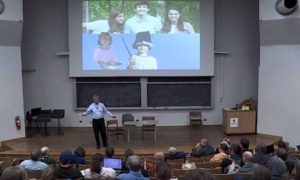Two decades ago, as our family reeled from a full-term stillbirth, I grappled with ways to help our then 6-year-old daughter work through the grief of losing an infant brother.
I searched for resources to offer reassurance and comfort, but there were scant few on the topic of death. And none I could find on stillbirth.
So, we muddled forward with our own words. Was I saying the right things? Were there “right things” to be said?
About a decade later, when a different daughter’s best friend died unexpectedly, I was given a book, “Parenting Beyond Belief,” edited by Dale McGowan. Suddenly I had a compass to help guide my child through grief, and advice on many other thorny topics.
McGowan later co-authored a practical, companion book and, this past year, released a second edition of the original.

This Saturday he’ll be at Indian Creek Nature Center at 1 p.m. to lead a Parenting Beyond Belief workshop — a donation-only event hosted by Humanists of Linn County, Freethinking Families of Linn County, Iowa Atheists and Freethinkers, and the Iowa Coalition of Reason.
And, yes, I know what you’re thinking because it’s what I thought when the book was placed in my hands. An atheist parenting manual? That description barely scratches the surface.
“The main ideas aren’t things that are necessarily tied to being non-religious,” McGowan told me. “It’s tied to freethinking, which is different. It’s allowing kids … to have autonomy in their own decision-making.”
For instance, a key question for workshop attendees: Am I an atheist raising children or am I raising atheist children?
“Those are two very different approaches, and I strongly side with the first,” he said.
Although McGowan, a former Catholic college professor, is non-religious, his parenting goal is to protect his children’s autonomy, to give them information and space to arrive at their own conclusions.
“I want you to make your own decisions. So here’s what I think and here are the opinions of some other people. And, no matter what you decide, I will love you no less, and I will support your decision,” he said.
That sentiment is at the heart of the book and, as McGowen says, “transcends the non-religious label.”
That said, the book was the country’s first comprehensive guide for secular parents — submitted as proof they aren’t alone, aimed at building social networks between parents raising freethinking kids.
Although the first edition was praised by religious readers for its “respectfulness,” it was released at a time when some atheists were publicly confronting religion.
“Parents are less often in that place. They aren’t trying to be part of a culture war; they’re trying to raise their kids,” McGowan said.
“So, it’s nice to see so many people taking a more relaxed approach to being non-religious in a culture that still has a lot of religious influence.”
The world has changed a lot between the two editions. In terms of population alone, more than one-fifth of U.S. residents are now religiously unaffiliated and, of those who attend church, many report doing so for cultural reasons.
Still, there’s no denying recent headlines: cultural divides remain. There’s never been a better time for a fresh generation of critical thinkers.
This column by Lynda Waddington originally published in The Gazette on August 26, 2017.
